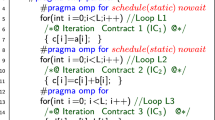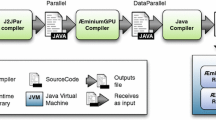Abstract
Adapting sequential legacy software to parallel environments can not only save time and money, but additionally avoids the loss of valuable domain knowledge hidden in existing code. A common parallelization approach is the use of standardized parallel design patterns, which allow making best use of parallel programming interfaces such as OpenMP. When such patterns cannot be implemented directly, it can be necessary to apply code transformations beforehand to suitably re-shape the input program. In this paper, we describe how we used Abstract Execution, a semi-automatic program proving technique for second-order program properties, to formally prove the conditional correctness of the restructuring techniques CU Repositioning, Loop Splitting and Geometric Decomposition—for all input programs. The latter two techniques require an advanced modeling technique based on families of abstract location sets.
This work was funded by the Hessian LOEWE initiative within the Software-Factory 4.0 project.
Access this chapter
Tax calculation will be finalised at checkout
Purchases are for personal use only
Similar content being viewed by others
Notes
- 1.
Note that a strongest loop invariant is not necessarily inductive. Indeed, if there are runs of the analyzed programs not satisfying the postcondition, there is no inductive invariant, although there is always a strongest one.
References
Aho, A.V., Sethi, R., Ullman, J.D.: Compilers: Principles, Techniques, and Tools. Addison-Wesley, Boston (1986)
Ahrendt, W., Beckert, B., Bubel, R., Hähnle, R., Schmitt, P.H., Ulbrich, M. (eds.): Deductive Software Verification - The KeY Book. LNCS, vol. 10001. Springer, Cham (2016). https://doi.org/10.1007/978-3-319-49812-6
Balser, M., Reif, W., Schellhorn, G., Stenzel, K., Thums, A.: Formal system development with KIV. In: Maibaum, T. (ed.) FASE 2000. LNCS, vol. 1783, pp. 363–366. Springer, Heidelberg (2000). https://doi.org/10.1007/3-540-46428-X_25
Barthe, G., Crespo, J.M., Kunz, C.: Relational verification using product programs. In: Butler, M., Schulte, W. (eds.) FM 2011. LNCS, vol. 6664, pp. 200–214. Springer, Heidelberg (2011). https://doi.org/10.1007/978-3-642-21437-0_17
Beckert, B., Ulbrich, M.: Trends in relational program verification. In: Müller, P., Schaefer, T. (eds.) Principled Software Development, pp. 41–58. Springer, Cham (2018). https://doi.org/10.1007/978-3-319-98047-8_3
Bertot, Y., Castéran, P.: Interactive Theorem Proving and Program Development - Coq’Art: The Calculus of Inductive Constructions. TTCS. Springer, Heidelberg (2004). https://doi.org/10.1007/978-3-662-07964-5
Blom, S., Huisman, M.: The VerCors tool for verification of concurrent programs. In: Jones, C., Pihlajasaari, P., Sun, J. (eds.) FM 2014. LNCS, vol. 8442, pp. 127–131. Springer, Cham (2014). https://doi.org/10.1007/978-3-319-06410-9_9
Bobot, F., Filliâtre, J.C., Marché, C., Paskevich, A.: Why3: shepherd your herd of provers. In: Boogie 2011: First International Workshop on Intermediate Verification Languages, pp. 53–64 (2011)
Boyer, R.S., Elspas, B., Levitt, K.N.: SELECT–a formal system for testing and debugging programs by symbolic execution. ACM SIGPLAN Not. 10(6), 234–245 (1975)
Bubel, R., Roth, A., Rümmer, P.: Ensuring the correctness of lightweight tactics for JavaCard dynamic logic. Electr. Notes Theor. Comput. Sci. 199, 107–128 (2008). https://doi.org/10.1016/j.entcs.2007.11.015
Dong, J., Sun, Y., Zhao, Y.: Design pattern detection by template matching. In: Wainwright, R.L., Haddad, H. (eds.) Proceedings of the 2008 ACM Symposium on Applied Computing (SAC), pp. 765–769. ACM (2008)
Fowler, M.: Refactoring: Improving the Design of Existing Code. Addison-Wesley Signature Series, 2nd edn. Addison-Wesley Professional, Boston (2018)
Gamma, E., Helm, R., Johnson, R., Vlissides, J.: Design Patterns: Elements of Reusable Object-Oriented Software. Addison-Wesley, Boston (1995)
Garrido, A., Meseguer, J.: Formal specification and verification of Java refactorings. In: Proceedings of the 6th IEEE International Workshop on Source Code Analysis and Manipulation, SCAM 2006, pp. 165–174. IEEE Computer Society, Washington, D.C. (2006). https://doi.org/10.1109/SCAM.2006.16
Godlin, B., Strichman, O.: Regression verification: proving the equivalence of similar programs. Softw. Test. Verif. Reliab. 23(3), 241–258 (2013). https://doi.org/10.1002/stvr.1472
Hähnle, R., Huisman, M.: Deductive software verification: from pen-and-paper proofs to industrial tools. In: Steffen, B., Woeginger, G. (eds.) Computing and Software Science. LNCS, vol. 10000, pp. 345–373. Springer, Cham (2019). https://doi.org/10.1007/978-3-319-91908-9_18
Hoare, C.A.R.: An axiomatic basis for computer programming. Commun. ACM 12(10), 576–580 (1969)
Huda, Z.U., Jannesari, A., Wolf, F.: Using template matching to infer parallel design patterns. TACO 11(4), 64:1–64:21 (2015). https://doi.org/10.1145/2688905
Jacobs, B., Smans, J., Philippaerts, P., Vogels, F., Penninckx, W., Piessens, F.: VeriFast: a powerful, sound, predictable, fast verifier for C and Java. In: Bobaru, M., Havelund, K., Holzmann, G.J., Joshi, R. (eds.) NFM 2011. LNCS, vol. 6617, pp. 41–55. Springer, Heidelberg (2011). https://doi.org/10.1007/978-3-642-20398-5_4
Jahr, R., Gerdes, M., Ungerer, T.: A pattern-supported parallelization approach. In: Balaji, P., Guo, M., Huang, Z. (eds.) Proceedings of the 2013 PPOPP International Workshop on Programming Models and Applications for Multicores and Manycores (PMAM), pp. 53–62. ACM (2013). https://doi.org/10.1145/2442992.2442998
Kassios, I.T.: The Dynamic Frames Theory. Formal Asp. Comput. 23(3), 267–288 (2011). https://doi.org/10.1007/s00165-010-0152-5
Khatchadourian, R., Tang, Y., Bagherzadeh, M., Ahmed, S.: Safe automated refactoring for intelligent parallelization of Java 8 streams. In: Atlee, J.M., Bultan, T., Whittle, J. (eds.) Proceedings of the 41st International Conference on Software Engineering (ICSE), pp. 619–630. IEEE/ACM (2019). https://doi.org/10.1109/ICSE.2019.00072
King, J.C.: Symbolic execution and program testing. Commun. ACM 19(7), 385–394 (1976)
Kovács, L., Voronkov, A.: First-order theorem proving and Vampire. In: Sharygina, N., Veith, H. (eds.) CAV 2013. LNCS, vol. 8044, pp. 1–35. Springer, Heidelberg (2013). https://doi.org/10.1007/978-3-642-39799-8_1
Kundu, S., Tatlock, Z., Lerner, S.: Proving optimizations correct using parameterized program equivalence. In: Proceedings of the PLDI 2009, pp. 327–337 (2009)
Leino, K.R.M.: Dafny: an automatic program verifier for functional correctness. In: Clarke, E.M., Voronkov, A. (eds.) LPAR 2010. LNCS (LNAI), vol. 6355, pp. 348–370. Springer, Heidelberg (2010). https://doi.org/10.1007/978-3-642-17511-4_20
Li, Z., Jannesari, A., Wolf, F.: Discovery of potential parallelism in sequential programs. In: 42nd International Conference on Parallel Processing, ICPP, pp. 1004–1013. IEEE Computer Society (2013)
Li, Z., Jannesari, A., Wolf, F.: An efficient data-dependence profiler for sequential and parallel programs. In: Proceedings of the 29th IEEE International Parallel and Distributed Processing Symposium (IPDPS), Hyderabad, India, pp. 484–493. IEEE Computer Society, May 2015. https://doi.org/10.1109/IPDPS.2015.41
Lopes, N.P., Menendez, D., Nagarakatte, S., Regehr, J.: Practical verification of peephole optimizations with alive. Commun. ACM 61(2), 84–91 (2018)
Massingill, B.L., Mattson, T.G., Sanders, B.A.: Parallel programming with a pattern language. Int. J. Softw. Tools Technol. Transf. 3(2), 217–234 (2001). https://doi.org/10.1007/s100090100045
Mattson, T.G., Sanders, B., Massingill, B.: Patterns for Parallel Programming. Pearson Education, London (2004)
de Moura, L., Bjørner, N.: Z3: an efficient SMT solver. In: Ramakrishnan, C.R., Rehof, J. (eds.) TACAS 2008. LNCS, vol. 4963, pp. 337–340. Springer, Heidelberg (2008). https://doi.org/10.1007/978-3-540-78800-3_24
Nipkow, T., Wenzel, M., Paulson, L.C. (eds.): Isabelle/HOL. LNCS, vol. 2283. Springer, Heidelberg (2002). https://doi.org/10.1007/3-540-45949-9
Norouzi, M., Wolf, F., Jannesari, A.: Automatic construct selection and variable classification in OpenMP. In: Proceedings of the International Conference on Supercomputing (ICS), Phoenix, AZ, USA, pp. 330–341. ACM, Jun 2019. https://doi.org/10.1145/3330345.3330375
Steinhöfel, D.: Abstract Execution: automatically proving infinitely many programs. Ph.D. thesis, Technical University of Darmstadt, Department of Computer Science, Darmstadt, Germany (2020). https://doi.org/10.25534/tuprints-00008540
Steinhöfel, D., Hähnle, R.: Modular, correct compilation with automatic soundness proofs. In: Margaria, T., Steffen, B. (eds.) ISoLA 2018. LNCS, vol. 11244, pp. 424–447. Springer, Cham (2018). https://doi.org/10.1007/978-3-030-03418-4_25
Steinhöfel, D., Hähnle, R.: Abstract Execution. In: Proceedings of the Third World Congress on Formal Methods - The Next 30 Years (FM), pp. 319–336 (2019). https://doi.org/10.1007/978-3-030-30942-8_20
Author information
Authors and Affiliations
Corresponding authors
Editor information
Editors and Affiliations
Rights and permissions
Copyright information
© 2020 Springer Nature Switzerland AG
About this paper
Cite this paper
Hähnle, R., Heydari Tabar, A., Mazaheri, A., Norouzi, M., Steinhöfel, D., Wolf, F. (2020). Safer Parallelization. In: Margaria, T., Steffen, B. (eds) Leveraging Applications of Formal Methods, Verification and Validation: Engineering Principles. ISoLA 2020. Lecture Notes in Computer Science(), vol 12477. Springer, Cham. https://doi.org/10.1007/978-3-030-61470-6_8
Download citation
DOI: https://doi.org/10.1007/978-3-030-61470-6_8
Published:
Publisher Name: Springer, Cham
Print ISBN: 978-3-030-61469-0
Online ISBN: 978-3-030-61470-6
eBook Packages: Computer ScienceComputer Science (R0)




